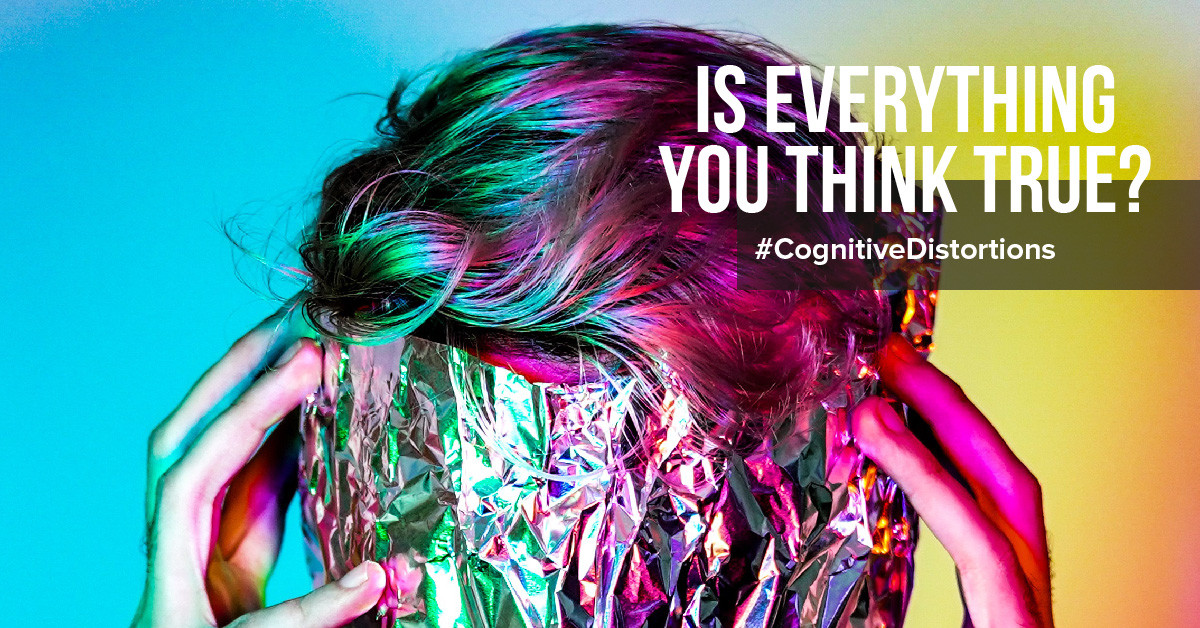Cognitive distortions explained | Is everything we think true?
A cognitive distortion is an unhealthy belief about something, someone, or a situation. A cognitive distortion can sometimes be useful, but when the distortion gets worse, it can be a big burden to others and certainly to yourself.
Everyone has cognitive distortions to a greater or lesser extent. That's a good thing. Otherwise, life would become very complex. Below I will explain how that works.
Cognitive distortions | The 12 most common distortions
Below I will discuss the 12 most common ones. Each of them can make your life very uncomfortable or even stressful. If you recognize yourself in one or more of the following cognitive distortions, it is wise to consult a mental coach on TheONE.

Cognitive distortions 1: Over-generalizing
One of the 15 most common distortions is generalizing. It is a very handy distortion in our daily lives. Suppose you walk through the woods and at every tree you have to think about what the object really is.
One tree is small and bare and the other large with wild branches and leaves, and yet we know that no matter how much they differ from each other, they are all trees. We generalize everything that has a trunk and branches like a tree. It saves a lot of time and thinking and makes our lives easier.
Cognitive distortions | The counter-side of generalizing
Unfortunately, some people can also over-generalize. Once in the late evening, in a dark alley - where you shouldn't have been at all in the first place - you have been attacked by a small man with a cap. For the rest of your life, you can then mistrust every little man with a cap as if all little men with a cap were robbers.
You can imagine how uncomfortable it is for someone like him to walk down the street when he or she always has to pay attention to whether or not there is a little man with a cap out there. Very tiring.
Cognitive distortions 2: Filtering
One walks in the forest and enjoys the scents and colors that the rich flora and fauna has to offer. The other sees a plastic bag in the same forest and irritates himself all day with the person who just left it there.
Anger, indignation, and irritation are the main theme because of one small plastic bag, as a result of which the person is entirely unaware of what is great about the forest. The person filters out one aspect of a situation in an environment that has so much more to offer.
Cognitive distortions 3: Thinking all or nothing
Something or someone is totally great or absolutely worthless. It's going to be a complete mess when you start thinking this about yourself. We are totally perfect or a complete fiasco. One mistake or blunder and you're a worthless loser.
People who think all or nothing have a very demanding life. Most of the time, they don't do anything until they know for sure that it will be perfect. Otherwise, they risk having to confront themselves with the thought that they are worthless good-for-nothing.
Cognitive distortions 4: Predictions
Some people are convinced that in every situation, they can predict the future. If you suggest a nice weekend trip, the person predicts that it will probably rain anyway without even considering a second to check the facts and rejects the idea. When - for example - Aunt Agatha comes along, they already know it's going to be a drama and act and anticipate it as if it were a reality.
It becomes even more annoying when the person starts predicting what you or others think about him or her without verifying it. Before you know it, the person has an imaginary army of enemies or friends.
Cognitive distortions 5: Accusing
The person who walks through the forest and irritates himself with the plastic bag can add to it by accusing people. "Because the bag was there, my day was ruined", they will be able to claim.
They can also accuse others of feeling bad about what others say or have done. When they also start predicting that there will be a plastic bag every 100 meters, the fun of going for a nice walk in the woods together with that person is over.
Cognitive distortions 6: Emotional reasoning
Some people believe that their emotions tell who they are and what is true. You feel unhappy because you've failed in something, so you must be a loser who can't do anything.
You feel sad about something someone has done or said - you blame and accuse that person of your emotions - and you believe that you are a sadly depressed person.
By not separating the emotions from the context in which they take place, emotions can become reality and people sometimes begin to reason emotionally.
Cognitive distortions 7: I Must
The plastic bag in the woods needs to be cleaned up. Without thinking about what exactly makes this necessary, these people are forced by themselves to do all kinds of things. This must be done, and that is not allowed.
As if the world perishes when something is not done that is supposed to happen. We must have a good job, and we must wash our cars every day. It is as if they spend all day thinking about what they can and cannot do with a criminal code.
It gets worse when they impose their 'must' on you, while you don't see the point of it at all. Let alone that you think it is really necessary.
Cognitive distortion 8: Reading Thought
It is always useful to be able to make some estimation of what someone might think about something. When you buy a gift for someone, think about what someone might think of it is a handy way to make sure you're buying the right gift.
Unfortunately, some people believe that they always know exactly what someone is thinking or will think. Based on previous experiences, they may even start to believe what someone is thinking based on a certain behavior or statement.
Cognitive Distortion 9: Making Personal
People who make things too personal think that it is always about them. Someone makes a general statement like: "some people are lazy" and the person immediately thinks it's about them.
In extreme cases, they even think they are responsible for earthquakes or other things that have nothing to do with the person.
Cognitive Distortion 10: Aggravate
Some things are annoying and others are bad. People who suffer from cognitive distortion aggravate will regularly use the words 'terrible', 'insane', and other exaggerated terms.
If one person says it is raining, the person who worsens will say it is pouring rain. If one says it's a bit of a mess in the house, the aggravator will say it's a fucking mess.
Minimising
Another effect of exacerbating cognitive distortion is to minimize it. A tsunami causes 200,000 deaths and the person then says there has been an accident.
Cognitive distortion 11: Labelling
People who like to label always have an all-embracing name for someone or something. Someone does something wrong and then they are either an asshole or stupid. As if one act can make you stupid. They don't talk about what exactly happened or was said but do so by giving the person a label. They don't talk about what exactly happened or was said but do so by giving the person a label. Usually a negative label as well.
Cognitive distortion 12: Polarizing / black and white thinking
Someone who thinks black and white does not want to see grey areas. Something or someone is right or wrong and there is no middle ground. They think and act in extremes such as beautiful or ugly, safe or dangerous, and smart or stupid.
Translated with www.DeepL.com/Translator (free version)
Cognitive therapy explained
In order to get rid of cognitive distortions, you can take cognitive therapy. The basis of cognitive therapy is that you learn that it is not the situation that evokes a feeling but your thoughts about the situation. You also learn the ability to replace unhealthy thoughts and meanings with healthy ones.
Cognitive therapy is also about becoming aware of your behavior. You learn which behavior is good for you and which is not. In addition, you will be better able to behave the way you are instead of how you think the situation or someone asks of you.
Finally, you learn that avoiding something is unhealthy and can even lead to certain fears and that you can lead a much happier life if you can let go of expectations.
Cognitive distortions | Learn more from mental coaches
If you want to learn more about cognitive distortions, call a life coach via TheONE. Instead of reading hundreds of self-help books and watch dozens of youtube movies, you'll save a lot of time by getting direct advice and insights from the people who write these books and make the movies.
-
Mursal AhmadiPsychologist / Coach€ 1,25 pm
-
Michelle MéndezHelping others€ 0,14 pm
-
Monisha DoleyLife coach, author€ 0,74 pm
-
Nilufar ArmakiPsychotherapist€ 1,00 pm
-
Allison HamptonTeacher€ 0,15 pm
-
Maria ZilbermanMedical student, Y4€ 0,92 pm





























